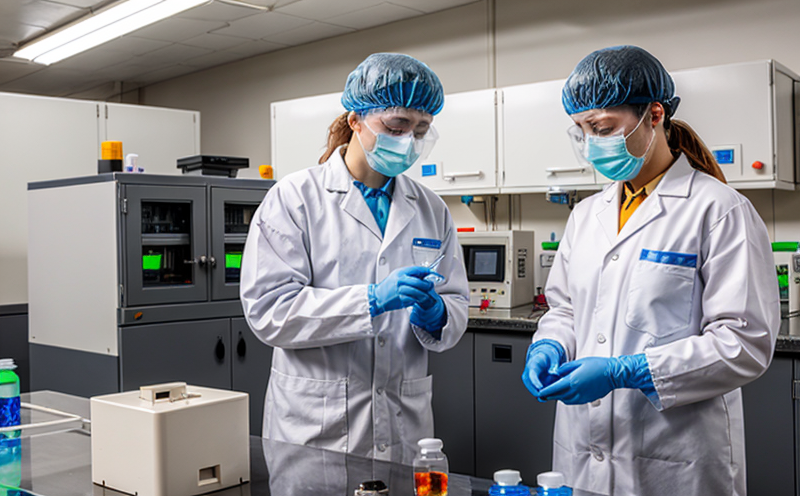ISO 47056 Acrylamide Testing in Coffee Substitutes
The emergence of acrylamide contamination in food and feed products has raised significant concern among regulatory bodies, quality managers, and compliance officers. Among these, coffee substitutes, a rapidly growing segment of the beverage market, pose unique challenges due to their complex composition. This service focuses on the ISO 47056 standard for determining acrylamide levels specifically in coffee substitutes.
Acrylamide is a hazardous chemical compound that forms during high-temperature food processing, particularly in carbohydrate-rich foods like coffee substitutes. Its presence can lead to health risks when consumed over extended periods. Compliance with ISO 47056 ensures that manufacturers and suppliers adhere to stringent safety standards, thereby protecting consumer health.
The testing process involves several critical steps: sample preparation, extraction of acrylamide from the coffee substitute matrix, quantification using liquid chromatography, and finally, verification against set thresholds. Given the complexity of coffee substitutes, ensuring accurate extraction is paramount for reliable results. This includes understanding the varying degrees of processing and formulation to accurately represent product characteristics.
The ISO 47056 standard provides a robust framework that guarantees consistency in testing methodologies across different laboratories. Compliance with this standard ensures that acrylamide levels are reported accurately, which can significantly impact brand reputation and regulatory compliance. For R&D engineers, this service offers insights into the nuances of product formulation that could influence acrylamide formation during processing.
For procurement professionals, understanding acrylamide testing is essential to ensure supplier adherence to safety standards. This service supports their role in maintaining high-quality raw materials and ensuring final products meet regulatory requirements.
The significance of this test extends beyond just compliance; it plays a crucial role in safeguarding consumer health by identifying potential risks early in the supply chain. By adhering to ISO 47056, manufacturers can demonstrate commitment to safety and quality, fostering trust among consumers.
Benefits
- Ensures compliance with international standards for acrylamide content in coffee substitutes.
- Reduces the risk of health hazards associated with acrylamide exposure.
- Enhances product safety and quality, boosting consumer trust.
- Maintains regulatory compliance, avoiding potential legal issues.
- Promotes brand reputation by demonstrating a commitment to product safety.
- Safeguards the supply chain from potentially harmful contaminants.
- Aids in research and development of safer processing methods.
International Acceptance and Recognition
The ISO 47056 standard for acrylamide testing is widely recognized and accepted globally. This international acceptance underscores its reliability and effectiveness in ensuring safe food products. Regulatory bodies from various countries have adopted this standard to maintain high safety standards.
International recognition of ISO 47056 highlights the importance of this service not just within a single country but across borders. Compliance with this standard is crucial for exports, as it ensures that exported coffee substitutes meet international safety and quality standards. This global acceptance also fosters trust among consumers who are increasingly concerned about product safety.
The widespread adoption of ISO 47056 reflects the growing awareness of acrylamide risks in food products. By adhering to this standard, manufacturers can confidently demonstrate their commitment to consumer health and safety, thereby enhancing brand reputation on a global scale.
Use Cases and Application Examples
| Use Case/Scenario | Description |
|---|---|
| Supplier Auditing | Testing acrylamide levels in coffee substitutes during supplier audits ensures that raw materials meet safety standards. |
| New Product Launches | Determining acrylamide levels during the development and launch of new coffee substitute products helps avoid potential risks early on. |
| Process Optimization | Regular testing can identify process parameters that contribute to higher acrylamide formation, aiding in optimization efforts. |
| Supply Chain Integrity | Monitoring acrylamide levels throughout the supply chain ensures consistent product quality and safety. |
| Compliance Monitoring | Periodic testing helps manufacturers stay compliant with regulatory requirements, avoiding potential fines or recalls. |
The use cases outlined above highlight the versatility of ISO 47056 acrylamide testing in ensuring product safety and compliance. By integrating this service into their quality assurance processes, organizations can proactively address potential risks and maintain a strong reputation for reliability.





